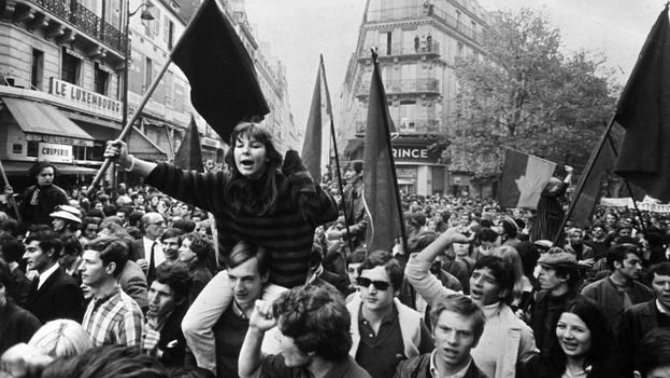Thesis 1
May 68 was the almost revolution: the world-historical moment 50 years ago when the young could have reshaped Europe in their own idealistic self-image. It began when a few militants challenged the puritanical authorities at Nanterre University. Their demands were soon picked up by peers at other campuses and these protests escalated into students and police fighting in the Latin Quarter. Seizing this opportunity, the Stalinist and Social Democratic trade unions called a general strike and millions of workers joined in the massive demonstrations filling the streets of Paris and other major cities. With universities, factories and public institutions under occupation, the conservative government was on the verge of collapse. President Charles de Gaulle had already fled to a French army base in Germany. Paris was once again the global centre of people’s revolution: 1789, 1830, 1848, 1871, 1936, 1944 – and 1968!
Thesis 2
May 68 was when the past betrayed the future. At this turning point in world history, the traditions of the twentieth century’s failed revolutions weighed like a nightmare on the brains of the living. Trade union activists knew of nothing better to do than to borrow the Social Democratic demands of the Popular Front and parody the Stalinist rhetoric of the French Resistance. Student militants reenacted the May 68 events in the time-honoured disguise and borrowed language of Trotskyism, Anarchism and Maoism. Tragically, the new left was still the old left. The leadership of this system-shattering movement couldn’t imagine anything more radical than higher living standards or a progressive government. When de Gaulle offered pay rises, welfare increases and new elections, they’d lost the game of revolution to a skilful general who understood his opponent’s weaknesses. Those who make a revolution half-way condemn themselves to defeat!
Thesis 3
May 68 was the first nationwide uprising against spectacular domination. All previous revolutions in France had fought for political democracy, social equality and economic prosperity. Living in a media-saturated affluent society with universal welfare services, the most advanced sections of the proletarian movement could now dare to be much more ambitious. Taking control of the universities, factories and public institutions, they experimented with the self-management of wealth creation, social care, cultural expression and everyday life. As the bureaucratic hierarchies of the state and market dissolved, people were liberated from the emotional, spatial and temporal disciplines of capitalist alienation. They were no longer passively watching TV screens – they were collectively shaping their own destiny. Deliberately forgotten by the official commemorations, this brief moment of cybernetic communist emancipation is the greatest achievement of the almost revolution!
Thesis 4
May 68 was the metamorphosis of socialist revolution into neoliberal counter-revolution. When the adult workers settled for a substantial pay rise, the young students’ dreams of a utopian society were betrayed by their proletarian heroes. With the class struggle discredited, academic and media chroniclers instead identified May 68 with the cultural rebellion of the baby boomer generation. The capitalist system might have survived intact, but France’s Catholic morality was soon swept away with the legalisation of divorce, abortion and LGBT equality. According to the postmodernist philosophers, the tyranny of the proletarian majority must be superseded by a multitude of identity minorities. The sexist, racist and homophobic workers are now the principle threat to the gains of May 68: in the twenty-first century’s global marketplace, vicious class exploitation is commendable as long as the ruling elite is 50 percent female, 10 percent BAME and 5 percent LGBT!
Thesis 5
May 68 is both the inspiration and inhibitor of the 2018 Left. For its fiftieth-anniversary celebrations, French workers and students are organising nationwide protests against the regressive neoliberal policies of President Emmanuel Macron. Their large demonstrations, campus occupations and violent clashes with the cops consciously evoke the May 68 struggles of five decades ago. Their mastery of social media has successfully subverted the ideological monopoly of the legacy broadcasters and newspapers. Equipped with better education and sophisticated technology, today’s left is more capable than its illustrious forebears of achieving the self-management of all social institutions. Yet, ironically, the most radical demands of the 2018 protests are those dismissed as reactionary back in May 68: higher living standards and a progressive government. Under neoliberal globalisation, there can be no alternative to the perpetual present. The serious reform of the decaying capitalist system is now the harbinger of the cybernetic communist revolution!
Richard Barbrook is a senior lecturer in politics at the University of Westminster, a founder member of Class Wargames and a director of the Digital Liberties cooperative
From the May 2018 issue of ArtReview
